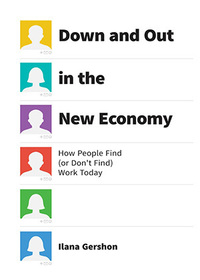
- Indiana University
- Associate Professor
- Residential Fellow (2015-2016)
- "Getting a Job in the Digital Age"
Ilana Gershon is an Associate Professor in the Department of Anthropology at Indiana University. She is interested in how new media affects highly charged social tasks, such as breaking up or hiring in the United States. She has written about how people use new media to end romantic relationships in her book The Breakup 2.0: Disconnecting over New Media. Her current research addresses how new media affects hiring in the contemporary U.S. workplace.
Professor Gershon' publications include the monograph Down and Out in the New Economy: How People Find (or Don't Find) Work Today (2017), written while a Fellow at the NDIAS, and the edited volume A World of Work: Imagined Manuals for Real Jobs, a collection of imagined job manuals for real jobs around the world, written for people who want to know how to be a professional wrestler in Mexico or a professional magician in Paris. She has also published No Family Is an Island: Cultural Expertise among Samoans in Diaspora, and edited special issues on topics ranging from ignorance, reflexivity, media ideologies, to the “newness” of new media. Her intellectual interests range from linguistic anthropology, science studies, media studies, legal anthropology, anthropology of democracy, and anthropology of work.
She has been a fellow at Stanford’s Center for Advanced Study in the Behavioral Sciences, a New Zealand Society fellow at Birkbeck College’s Center for New Zealand Studies, and received grants from the National Science Foundation, the Social Science Research Council and the Wenner-Gren Foundation. She has also co-organized a Mellon Sawyer Seminar on science and technology studies at Indiana University.
Publications
-
Click for Work: Rethinking Work Through Online Work Distribution Platforms
ephemera: theory & politics in organization, 2020
Online work distribution platforms such as Amazon Mechanical Turk or Uber alter how work tasks are chosen or assigned. Put succinctly, instead of the employer choosing the employee, the worker chooses the task. Responses to these new technological possibilities for distributing tasks are all deeply influenced by the contemporary historical moment, which privileges approaches to workers that take them to be neoliberal market actors. In this article, we examine how these platforms interact with current ideas about work and contemporary configurations of work by altering the ways work is accomplished both within and outside of an organization through open calls. In particular, we focus on the challenges these platforms bring to the problems of coordination ever-present in any project of designing the work, disseminating the work, and controlling the work process.
-
Down and Out in the New Economy: How People Find (or Don’t Find) Work Today
The University of Chicago Press, 2017

Finding a job used to be simple. You’d show up at an office and ask for an application. A friend would mention a job in their department. Or you’d see an ad in a newspaper and send in your cover letter. Maybe you’d call the company a week later to check in, but the basic approach was easy. And once you got a job, you would stay—often for decades.
Now … well, it’s complicated. If you want to have a shot at a good job, you need to have a robust profile on LinkdIn. And an enticing personal brand. Or something like that—contemporary how-to books tend to offer contradictory advice. But they agree on one thing: in today’s economy, you can’t just be an employee looking to get hired—you have to market yourself as a business, one that can help another business achieve its goals.
That’s a radical transformation in how we think about work and employment, says Ilana Gershon. And with Down and Out in the New Economy, she digs deep into that change and what it means, not just for job seekers, but for businesses and our very culture. In telling her story, Gershon covers all parts of the employment spectrum: she interviews hiring managers about how they assess candidates; attends personal branding seminars; talks with managers at companies around the United States to suss out regional differences—like how Silicon Valley firms look askance at the lengthier employment tenures of applicants from the Midwest. And she finds that not everything has changed: though the technological trappings may be glitzier, in a lot of cases, who you know remains more important than what you know.
Throughout, Gershon keeps her eye on bigger questions, interested not in what lessons job-seekers can take—though there are plenty of those here—but on what it means to consider yourself a business. What does that blurring of personal and vocational lives do to our sense of our selves, the economy, our communities? Though it’s often dressed up in the language of liberation, is this approach actually disempowering workers at the expense of corporations?
Rich in the voices of people deeply involved with all parts of the employment process, Down and Out in the New Economy offers a snapshot of the quest for work today—and a pointed analysis of its larger meaning.
-
Language and the Newness of Media
Annual Review of Anthropology, 2017
How is the newness of new media constructed? Rejecting technological determinism, linguistic anthropologists understand that newness emerges when previous strategies for coordinating social interactions are challenged by a communicative channel. People experience a communicative channel as new when it enables people to circulate knowledge in new ways, to call forth new publics, to occupy new communicative roles, to engage in new forms of politics and control—in short, new social practices. Anthropologists studying media have been modifying the analytical tools that linguistic anthropologists have developed for language to uncover when and how media are understood to provide the possibilities for social change and when they are not. Taking coordination to be a vulnerable achievement, I address recent work that elaborates on the ways that linguistic anthropology segments communication to explore how a particular medium offers its own distinctive forms of authorship, circulation, storage, and audiences.
-
Living with Animals: Bonds Across Species
Cornell University Press, 2018

Living with Animals is a collection of imagined animal guides—a playful and accessible look at different human-animal relationships around the world. Anthropologists and their co-authors have written accounts of how humans and animals interact in labs, in farms, in zoos, and in African forests, among other places. Modeled after the classic A World of Babies, an edited collection of imagined Dr. Spock manuals from around the world—Living With Animals focuses on human-animal relationships in their myriad forms.
This is ethnographic fiction for those curious about how animals are used for a variety of different tasks around the world. To be sure, animal guides are not a universal genre, so Living with Animals offers an imaginative solution, doing justice to the ways details about animals are conveyed in culturally specific ways by adopting a range of voices and perspectives. How we capitalize on animals, how we live with them, and how humans attempt to control the untamable nature around them are all considered by the authors of this wild read.
If you have ever experienced a moment of “what if” curiosity—what is it like to be a gorilla in a zoo, to work in a pig factory farm, to breed cows and horses, this book is for you. A light-handed and light-hearted approach to a fascinating and nuanced subject, Living with Animals suggests many ways in which we can and do coexist with our non-human partners on Earth.
-
Undercover Boss Blues
Anthropology Today, 2018
Undercover Boss is a reality TV show designed for and by people who take capitalism for granted and who are reflecting on crises that are part and parcel of what it means to live under a capitalist system. Undercover Boss was first launched on Channel 4 in the UK in 2009, and country-specific spin-offs have since appeared in 16 other countries, including Australia, Colombia and Poland. Like the other variants, the UK version is not only an exploration of workplaces inflected by neo-liberal logics, but also an exploration of how businesses are responding to the financial crisis of 2008. In the UK version, the bosses agree to go undercover in the hope that low-level employees might provide some insights from their structural position into how to improve the way the company responds to its customers. This is a show that revolves around revealing some of the ‘shoulds’ of business from a worker’s perspective, but in doing so, it uncovers a few of the dilemmas generated when corporations put neo-liberal principles into practice.
-
Undercover Boss's Travels: Comparing the US and UK Reality Shows
Visual Anthropology Review, 2019
Comparing different versions of Undercover Boss reveals how an assemblage of TV producers, camera crews, businesses, and broadcasters choose to portray corporate hierarchies during the financial crisis of 2008 when corporations seemed like especially vulnerable forms of social organization for workers to rely upon. This article approaches the same show done in two different countries as a natural experiment that can reveal national differences through a textual comparison. The US show relies upon a sentimental imagination such that knowledge of the other is based on an emotional connection to the past. The UK show relies upon an organizational imagination in which the structural roles one plays in a company shape what one knows of how the company functions. Each version portrays distinctive approaches to three issues: (1) what can be known about people as social actors; (2) what is portrayed as ethical or appropriate workplace relationships; and (3) what kinds of tacit critiques of contemporary capitalism are possible.